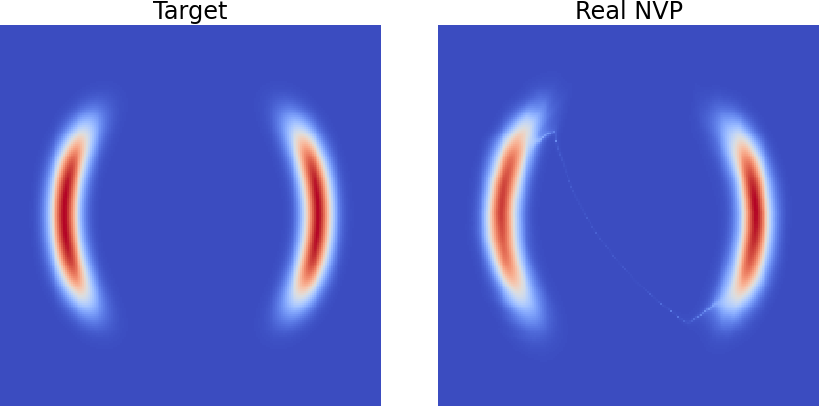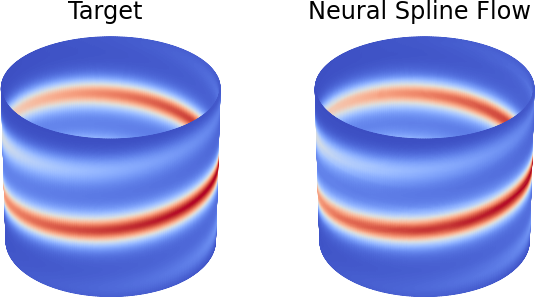normflows is a PyTorch implementation of discrete normalizing flows. Many popular flow architectures are implemented,
see the list below. The package can be easily installed via pip.
The basic usage is described here, and a full documentation
is available as well. A more detailed description of this package is given in out accompanying
paper.
Several sample use cases are provided in the
examples folder,
including Glow,
a VAE, and
a Residual Flow.
Moreover, two simple applications are highlighed in the examples section. You can run them
yourself in Google Colab using the links below to get a feeling for normflows.
| Link | Description |
|---|---|
| Real NVP applied to a 2D bimodal target distribution | |
| Modeling a distribution on a cylinder surface with a neural spline flow | |
| Modeling and generating CIFAR-10 images with Glow |
| Architecture | Reference |
|---|---|
| Planar Flow | Rezende & Mohamed, 2015 |
| Radial Flow | Rezende & Mohamed, 2015 |
| NICE | Dinh et al., 2014 |
| Real NVP | Dinh et al., 2017 |
| Glow | Kingma et al., 2018 |
| Masked Autoregressive Flow | Papamakarios et al., 2017 |
| Neural Spline Flow | Durkan et al., 2019 |
| Circular Neural Spline Flow | Rezende et al., 2020 |
| Residual Flow | Chen et al., 2019 |
| Stochastic Normalizing Flow | Wu et al., 2020 |
Note that Neural Spline Flows with circular and non-circular coordinates are supported as well.
The latest version of the package can be installed via pip
pip install normflows
At least Python 3.7 is required. If you want to use a GPU, make sure that PyTorch is set up correctly by following the instructions at the PyTorch website.
To run the example notebooks clone the repository first
git clone https://github.com/VincentStimper/normalizing-flows.git
and then install the dependencies.
pip install -r requirements_examples.txt
A normalizing flow consists of a base distribution, defined in
nf.distributions.base,
and a list of flows, given in
nf.flows.
Let's assume our target is a 2D distribution. We pick a diagonal Gaussian
base distribution, which is the most popular choice. Our flow shall be a
Real NVP model and, therefore, we need
to define a neural network for computing the parameters of the affine coupling
map. One dimension is used to compute the scale and shift parameter for the
other dimension. After each coupling layer we swap their roles.
import normflows as nf
# Define 2D Gaussian base distribution
base = nf.distributions.base.DiagGaussian(2)
# Define list of flows
num_layers = 32
flows = []
for i in range(num_layers):
# Neural network with two hidden layers having 64 units each
# Last layer is initialized by zeros making training more stable
param_map = nf.nets.MLP([1, 64, 64, 2], init_zeros=True)
# Add flow layer
flows.append(nf.flows.AffineCouplingBlock(param_map))
# Swap dimensions
flows.append(nf.flows.Permute(2, mode='swap'))Once they are set up, we can define a
nf.NormalizingFlow
model. If the target density is available, it can be added to the model
to be used during training. Sample target distributions are given in
nf.distributions.target.
# If the target density is not given
model = nf.NormalizingFlow(base, flows)
# If the target density is given
target = nf.distributions.target.TwoMoons()
model = nf.NormalizingFlow(base, flows, target)The loss can be computed with the methods of the model and minimized.
# When doing maximum likelihood learning, i.e. minimizing the forward KLD
# with no target distribution given
loss = model.forward_kld(x)
# When minimizing the reverse KLD based on the given target distribution
loss = model.reverse_kld(num_samples=512)
# Optimization as usual
loss.backward()
optimizer.step()We provide several illustrative examples of how to use the package in the
examples
directory. Amoung them are implementations of
Glow,
a VAE, and
a Residual Flow.
More advanced experiments can be done with the scripts listed in the
repository about resampled base distributions,
see its experiments
folder.
Below, we consider two simple 2D examples.
In this notebook, which can directly be opened in Colab, we consider a 2D distribution with two half-moon-shaped modes as a target. We approximate it with a Real NVP model and obtain the following results.
Note that there might be a density filament connecting the two modes, which is due to an architectural limitation of normalizing flows, especially prominent in Real NVP. You can find out more about it in this paper.
In another example, which is available in Colab as well, we apply a Neural Spline Flow model to a distribution defined on a cylinder. The resulting density is visualized below.
This example is considered in the paper accompanying this repository.
If you have problems, please read the package documentation and check out the examples section above. You are also welcome to create issues on GitHub to get help. Note that it is worthwhile browsing the existing open and closed issues, which might address the problem you are facing.
If you find a bug or have a feature request, please file an issue on GitHub.
You are welcome to contribute to the package by fixing the bug or adding the feature yourself. If you want to
contribute, please add tests for the code you added or modified and ensure it passes successfully by running pytest.
This can be done by simply executing
pytest
within your local version of the repository. Make sure you code is well documented, and we also encourage contributions to the existing documentation. Once you finished coding and testing, please create a pull request on GitHub.
The package has been used in several research papers, which are listed below.
Andrew Campbell, Wenlong Chen, Vincent Stimper, José Miguel Hernández-Lobato, and Yichuan Zhang. A gradient based strategy for Hamiltonian Monte Carlo hyperparameter optimization. In Proceedings of the 38th International Conference on Machine Learning, pp. 1238–1248. PMLR, 2021.
Vincent Stimper, Bernhard Schölkopf, José Miguel Hernández-Lobato. Resampling Base Distributions of Normalizing Flows. In Proceedings of The 25th International Conference on Artificial Intelligence and Statistics, volume 151, pp. 4915–4936, 2022.
Laurence I. Midgley, Vincent Stimper, Gregor N. C. Simm, Bernhard Schölkopf, José Miguel Hernández-Lobato. Flow Annealed Importance Sampling Bootstrap. arXiv preprint arXiv:2208.01893, 2022.
Moreover, the boltzgen package
has been build upon normflows.
If you use normflows, please consider citing the corresponding paper as follows.
Vincent Stimper, David Liu, Andrew Campbell, Vincent Berenz, Lukas Ryll, Bernhard Schölkopf, José Miguel Hernández-Lobato. normflows: A PyTorch Package for Normalizing Flows, arXiv preprint arXiv:2302.12014, 2023.
Bibtex
@article{normflows,
author = {Vincent Stimper and David Liu and Andrew Campbell and Vincent Berenz and Lukas Ryll and Bernhard Sch{\"o}lkopf and Jos{\'e} Miguel Hern{\'a}ndez-Lobato},
title = {normflows: {A} {P}y{T}orch {P}ackage for {N}ormalizing {F}lows},
journal = {arXiv preprint arXiv:2302.12014},
year = {2023}
}





